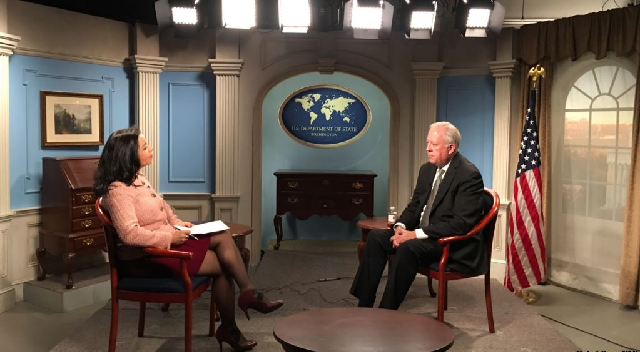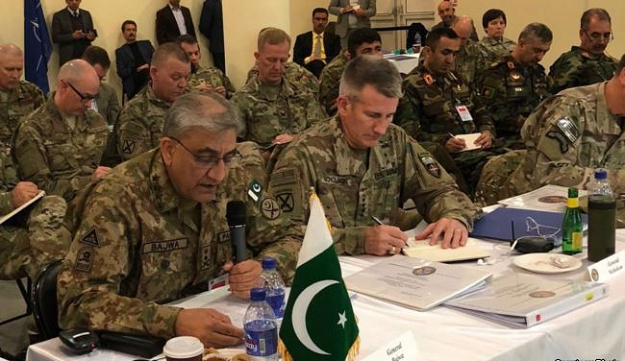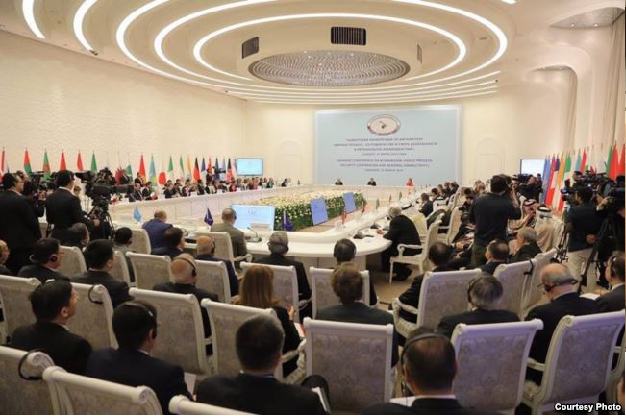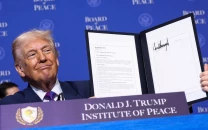'Reciprocal' travel restrictions to be imposed on Pakistan diplomats: US
Pakistan can benefit from playing a meaningful role in the Afghan process, says US official

In an exclusive interview with Voice of America's Uzbek Service, Shannon said, "Our diplomats are under travel restrictions. They can travel further [than 40 kilometres], but they have to notify the government of Pakistan. It's very common in diplomacy".
When contacted, the US embassy declined to comment on the nature of restrictions and said, "We are not prepared to announce anything on this matter."
Trump signs new travel ban, imposes restrictions on 8 countries
"What's important here is that we've had some very fruitful conversations with Pakistan about events inside of Afghanistan. It's my hope that we're going to be able to build off those in a way that helps this broader reconciliation process," said the US diplomat when probed further.
Pakistan and Central Asia
The US official, while referring to counter-terrorism and fighting extremism in Pakistan, said the US is not the only partner which cooperates with Islamabad on such issues. "China is a very important partner for Pakistan," Shannon said and added, "Russia, it's not as bigger a partner as China is for Pakistan. Russia is historical on the region is conflicted, but we're very prepared, and we'll be very happy to have a larger conversation with Russia about this also."
On the question of Pakistan being mentioned as a 'source of concern' and working with the country, Shannon said, "I'm not sure how much we can help that process because this is really something that Pakistanis have to understand." The under-secretary then said that Pakistan needs to understand the concerns of Central Asian countries.
The top diplomat also said that Pakistan can benefit from playing a 'meaningful' role in the Afghan process which will better relations with neighbours and other Asian countries.
 Pakistan army chief General Qamar Javed Bajwa (L) and Commadner of U.S. and Resolute Support military mission General John Nicholson attending the security conference in Kabul, Feb. 13, 2018.PHOTO: ISPR
Pakistan army chief General Qamar Javed Bajwa (L) and Commadner of U.S. and Resolute Support military mission General John Nicholson attending the security conference in Kabul, Feb. 13, 2018.PHOTO: ISPRTashkent Conference
Shannon represented the US in the recently held Tashkent conference on the future of Afghanistan. He highlighted the importance of the conference due to its link to the Kabul Peace Process and Afghan President Ashraf Ghani's offer to the Taliban for peace talks.
"For us, what was interesting and useful about Tashkent is that it took the purpose of President Ghani and it took a process that began in Kabul, it brought it to Tashkent and then internationalised it," he added.
The senior US official also said that the conference sent a strong message to the Taliban that the only way out is through negotiations. "Many countries especially Afghanistan's neighbours have different interests in Afghanistan, but I think all the participants understood the importance of peace in Afghanistan," he added.
 Tashkent Conference on the Future of Afghanistan, March 27, 2018. (Uzbekistan President's Press Office)PHOTO: VOA
Tashkent Conference on the Future of Afghanistan, March 27, 2018. (Uzbekistan President's Press Office)PHOTO: VOAPakistan and Afghanistan
When asked if regional countries would be able to work together for achieving peace in war-torn Afghanistan, Shannon replied positively and said, "Central Asian countries recognise that they sit on top of Afghanistan and what happens in Afghanistan has a big impact," he further added.
"We need to take countries at their word until they show us otherwise a reason not to take them at their word," Shannon said, adding that countries neighbouring Afghanistan have multiple differences and interests.
US State Department denies imposition of travel restrictions on Pakistani diplomats
"Now, it's really time to call people to the peace table and say, 'This is where we need solidarity with the people of Afghanistan, with the government of Afghanistan, and this is where the international community can play a meaningful role'".
"It will be much easier to work with Pakistan in attempting to fashion peace in Afghanistan as opposed to trying to fashion a way to fight the war," he added.
He further highlighted the need for the South-Central Asian region to be peaceful and not be a "crash pad between great powers".
"The region sits right above the larger Indian Ocean rim, which is going to be one of the most important strategic areas of either cooperation or competition in the 21st century because of the goods and services and the oil and gas that moves through this region," he added.
US 'to impose new restrictions' on Pakistani diplomats
Pakistan-US relations
Pakistan's Ambassador Aizaz Ahmad Chaudhry on Wednesday delivered a talk on 'Pakistan's Place in the World' at Johns Hopkins School of Advanced International Studies (SAIS).
A series of tweets from Pakistan Embassy covered the talk. Chaudhry said relations with the US are very important for Pakistan and this realisation is prevalent across all segments of Pakistani polity. He further added that Pakistan, for its part, has fared well in challenging and changing times.
"The country has defeated terrorism, the economy is picking up and democratic process is on track despite challenges."
While speaking at Johns Hopkins University School of Advanced International Studies (SAIS),Ambassador said Pakistan,for its part,has fared well in challenging & changing times.The country has defeated terrorism,eco. is picking up &democratic process is on track despite challenges pic.twitter.com/uEe3z2PHOd
— Pakistan Embassy US (@PakinUSA) April 17, 2018
Ambassador Aizaz Chaudhry said that relations with the US are very important for Pakistan and this realization is prevalent across all segments of Pakistani polity. pic.twitter.com/BHSmwjKr0B
— Pakistan Embassy US (@PakinUSA) April 17, 2018



















COMMENTS
Comments are moderated and generally will be posted if they are on-topic and not abusive.
For more information, please see our Comments FAQ